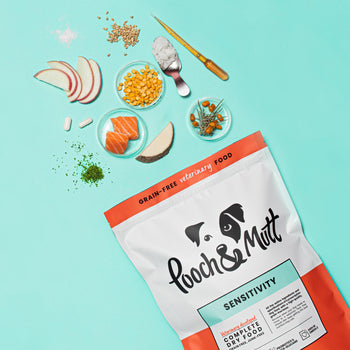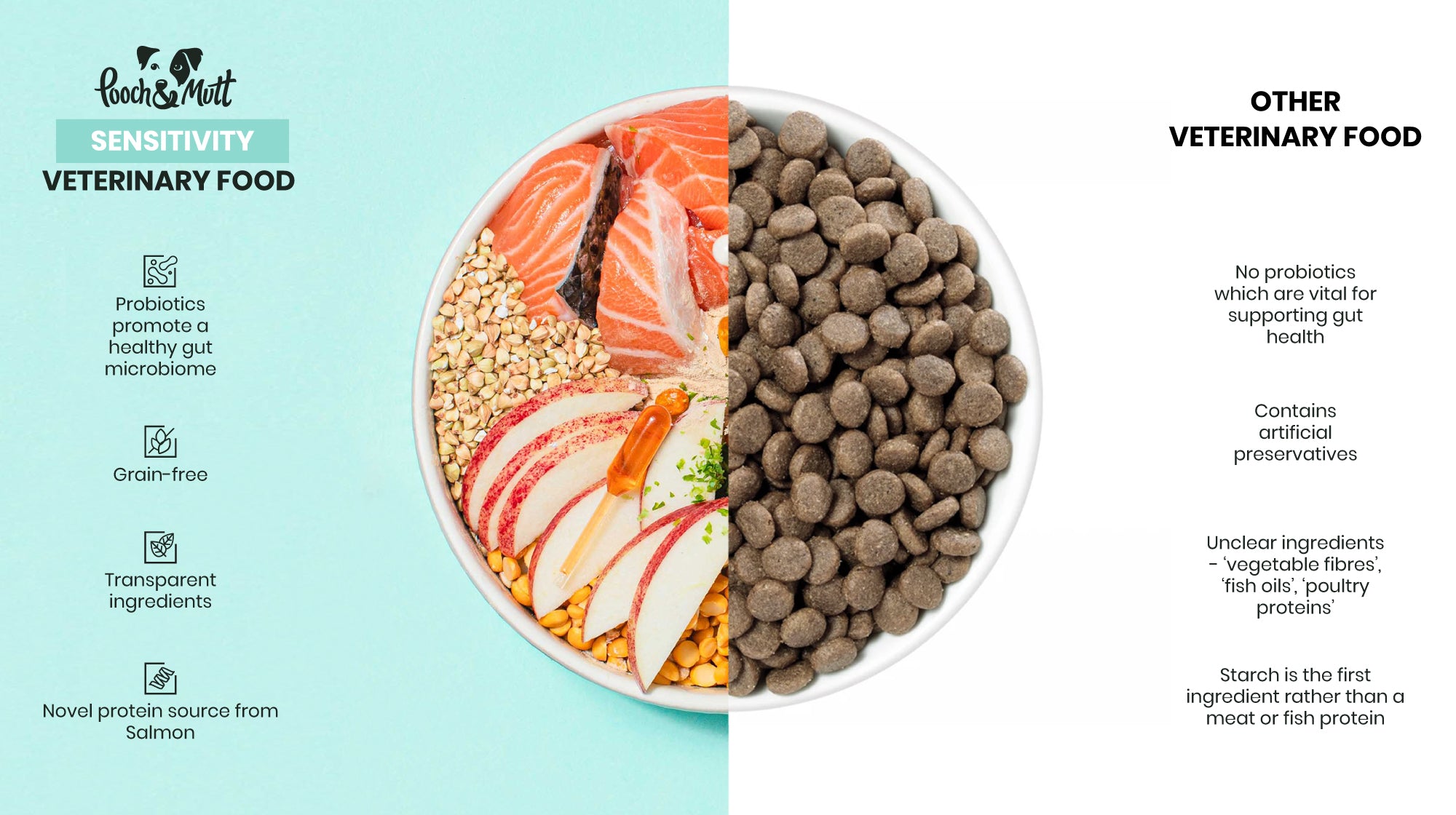
FREE UK DELIVERY ON ORDERS OVER £39.99
Dogs get allergies just like us - from grass, pollen and eggs to fabrics and fleas.
Unsurprisingly though, the culprit is often their food, and not monitoring what your dog eats means their unwanted allergy symptoms may cause them (and you!) hassle.
In a lot of cases, food allergies in dogs present as itchy or irritated skin - in fact, excessive itching is one of the most common reasons their owners take them to the vets! If you’re somewhat in the dark over skin allergies in dogs, what causes them and what symptoms to look out for, we’ve gone into more detail here.
For this article however, we’ll be discussing the best food to give a dog with food allergies; pooches who suffer from symptoms such as skin irritation, digestive issues, ear infections and sickness due to something they eat.
In theory, dogs can be allergic to any food - but the six most common food allergies in dogs are beef, chicken, eggs, dairy, soy and grains. You might be thinking “but chicken and beef are favourites for dogs”. This is often why they’re listed as common allergens - there are simply more cases of these food allergies due to the frequent usage of these meats in commercial dog foods. Interestingly, the more dogs eat something every day, the more likely they are to develop an allergic reaction to it.
You can read more here about the various types of food allergies in dogs and common symptoms associated with them.
If you’ve noticed your dog develops allergy symptoms to something they’ve eaten, you’ll want to track that food down! Identifying your dog’s potential food allergy can be a long-winded process that takes many months; however the results are 100% worth it. By nipping those nasty symptoms at the source, you’ll learn more about your dog’s digestive needs and have more power to increase their comfort and wellbeing.
As we said, this can seem long-winded - and even feel cruel to change your dog’s diet so drastically. Remember it’s for their own good, so don’t give up on the stripped-back diet after only a couple of weeks. It can take as long as three months for all proteins to leave a dog’s body, and it’s only then that you’ll have a good basis to ‘test’ which food could be the trigger of your dog’s allergy troubles.
Once you’ve identified your dog’s food allergy, congratulate yourself on a job well done! Now it’s time to adjust your dog’s diet so that they’re rarely exposed to the triggering food and can eat freely and hungrily without the addition of any pain, bloating or irritation.
Sometimes, a vet might recommend a novel protein food for your dog with allergies - it could also be called ‘single source dog food’ or ‘limited ingredient dog food’. It can be given to a dog after their food allergy is already identified, or during their elimination diet.
A novel protein dog food is a specialist food formulated for dogs with food allergies, sensitivities or intolerances. As a dog’s food allergy is usually to a protein such as beef, chicken or eggs, a novel protein food includes a niche protein product instead. The aim is to use a tasty, nutritious protein that the dog is unlikely to have eaten before.
Here’s the clever part. Allergies develop after a dog has eaten something so frequently over the years, such as beef or chicken, that their immune system has become desensitised to its presence. As a novel protein food includes meat that the dog has supposedly never eaten before, their immune system will detect the new food, fight off any negative effects that lead to undesirable allergy symptoms, and digest the protein with no issues.
Novel protein foods are a great option for pooches with a beef or chicken allergy, for instance - and a good ‘detox’ food when you’re carrying out an elimination diet for your pooch. Our Pooch & Mutt Vet Food for Sensitivity contains Hydrolysed Salmon Protein, which is a novel protein source.
If your pooch has food allergies, sensitivities or intolerances, it’s likely you’ll be recommended to try a hypoallergenic dog food. A lot of specialist dog foods can be called ‘hypoallergenic’ - it’s a descriptor rather than an exclusive type of food - so there is overlap with lots of other dog foods such as grain-free food and food for stomach sensitivity.
Hypoallergenic food for dogs is made to be safer on a dog’s digestion - it’s been formulated with ingredients that are less likely to trigger an adverse reaction in your dog’s body, so it’s especially good for dogs with food allergies, sensitivities and intolerances.
There are common food allergies in dogs; usually beef, chicken, eggs, dairy, soy and grains. Hypoallergenic food is made without any of these ingredients so it’s safer for dogs with sensitive stomachs or who suffer adverse reactions to a standard diet. Hypoallergenic food is often (but not always) grain-free, and is made with nutritious, high-quality ingredients to boost a dog’s health and digestion.
Dogs with food allergies will thrive on a diet that’s made with their dietary restrictions in mind. It will usually have the following:
Our Pooch & Mutt Vet Food for Sensitivity has been made with the above criteria in mind, and is a premium-quality, vet-recommended food for dogs with food allergies, sensitive stomachs or intolerances.

As well as being grain-free (our specialty) it’s also packed with hydrolysed salmon, peas and buckwheat, a delicious combo which can be gently digested by a pooch’s sensitive tum without bother. There’s also coconut oil as a source of good fats, apple pulp for improved poop consistency, and prebiotics and probiotics to promote a harmonious environment in your dog’s gut.
If you’ve put your dog on an elimination diet to allow for allergy symptoms to clear up, this could take anything from six weeks to three months. But food allergies in general are usually long-term for a dog, and should be considered a health condition to be handled with care throughout the dog’s life; using specialist food and thoughtful dietary choices.
Though a food allergy is usually life-long for a dog, it doesn’t mean they have to go without delicious, nutritious food that promotes a happy, energised life and healthy growth. As well as choosing the right dog food, be sure to avoid all other triggering foods such as human scraps or fatty treats.
If your pooch is fed a long-term diet that doesn’t trigger their allergies, the symptoms of their allergy may be greatly diminished and they’ll feel a lot happier and calmer within themselves.
If your dog needs a tasty, grain-free specialist food for sensitive stomachs and food allergies, try our Vet Food for Sensitivity. Our grain-free Vet range has been developed for dogs with all kinds of specialist health issues, take a look at the full collection here.
References






Never miss a treat!
Subscribe to our newsletter and get blog articles amongst other treats delivered to your inbox

Comments (19)
My dog sonny has skin problems itchy he is a bichon frise what food should I feed him I bought the skin and coat one what would you recommend he is 12 years old
I was a subscriber my springer became intolerant to your chicken superfood
I am interested in trying this kibble
I also think you should consider other single proteins in this range . Rabbit / venison . There are a lot of dogs out there who need you help .
Finding suppliers a nitemare. I was even considering a raw diet as easier to manage the rotation of protein .
I hope you can help
Hey Denise, thank you for your feedback! We will get this information passed onto the team about other flavours :)
Hey Andrea! One of the team will be in touch with your directly to discus your pooches needs :)
Hi I am interested in this Vet food could you give some advise if this would suit him I have a six year old Mixed breed ShiuTzu/LapsoApso he has had two Ear infections just this year one in March and now again in May he has not had them before he does have itchy ears and skin which is more in the summer months and he does have a sensitive Stomach and I am careful in what food I feed him he does bring up bile on occasions he is Allergic to chicken so I avoid anything with chicken in I do prefer to feed him hypoallergenic dog food at the moment he has Canagan Small breed Dental Dry food which he does like I tried him on your pooch and Mutt dry food for health and digestion for sensitive stomach and the Shiny skin and coat one but that helps with allergies and itching unfortunately he would not eat them as I like the fact that your food has prebiotic and prebiotic included for gut health so I would like to ask if you think that this food would help him I am going back to my Vets on The 8th June for his Ears so I could ask them about this food to see what they think I was interested that it can most help with Ear infections and itching and sensitive stomach which he can suffer with I would be very grateful if you could advise if this food would help Many Thanks Valerie
Hi Valerie, it is likely that this food might be a great option for your pooch but we would always advise checking with your vet first and getting their feedback when skin allergies are involved. :)
Hi, my dog Trinny has been on a soya hydrolysed food since beginning of May. Vet thinks she is allergic to chicken and has trouble breaking down her protein. Whilst she has been fine on this new diet it is very high in carbs and I’d like her to switch. Would this food be suitable to try?
Hi Mandy, we would advise checking with your vet as our Sensitivity food does contain Salmon Protein as well as hydrolysed salmon protein. If you have any other questions, please reach out to the team on [email protected] :)
Hi, I have a French bull dog who has terrible allergies, mainly from grass, but chicken is also a no no. She suffers mainly with her ears and chews her feet. Do you think this sensitivity diet will help.
Have tried
Royal canin
James beloved
My butcher
Any advice ?
My staffy/Lab is driven mad with itching.. I have out flea collar on her also wormed her and had her anal glands emotied at the bets but she has bald patches now what can I do???
Hi Chrissie,
It sounds like your pooch might be having an allergic reaction to something, whether its an ingredient in their food or a seasonal reaction. It might be worth speaking to your vet about this and looking into an elimination diet, where you feed a single protein to rule out a possible allergen. :)
Hi Julie, Our sensitivity diet may help if their itching is mainly related to food sensitivities. If you feel it is mainly the grass which is causing her trouble, it might be worth speaking to your vet to see if there are any medicated washes that might be more beneficial. :)
Hi, I’ve recently put my dog on your sensitive food, can you tell me how many calories are in 100g so I know how much to feed her. Thanks
I am struggling and wonder if you can help. My French bill dog can tolerate the wet food fish pot and pea but has lost weight. As a 10 kg dog I have now increased to the amount a 15 kg dog should be eating. The dry foods contain buckwheat which she is allergic to. She can tolerate the turkey potatoe and pea but I would like too add in some dry food. She has so many allergies. Can I please send you details of analysis report.
Hi Blanche,
We do have other dry foods available that might suit your pooch and don’t contain any buckwheat. Our Skin & Coat dry food is one of them and might be worth taking a look. If you want to discuss this further, please reach out to the team on [email protected] :)
Hi, my dog is on Royal canine at the moment recommend by vet due to allergies but only for 8 weeks. I’m just wondering is your product OK for long term use as royal canine isn’t. Thank you.
Hi Claire, we would advise using initially for 3 – 8 weeks: if signs of intolerance disappear, it can be used up to 1 year. In the case of dermatosis use initially up to 2 months. Regular vet check ups should be scheduled to monitor your pet’s health condition whilst on this diet. Consult with your vet in cases of chronic health issues for longer term / lifetime use, to check whether this food would be suitable for them. :)
Hi, I’ve had my dog allergy tested and it says she has an allergy to trees that produce apples so to avoid the trees and pollen. Would my dog be able to have apple pulp which is in your sensitive food?
Hi Jody, with your pooch having an allergy to trees that produce apples, it might be best avoiding any food that contains apple pulp to be on the safe side. Please do reach out to us on [email protected] if you would like any help with this. :)
Leave a comment